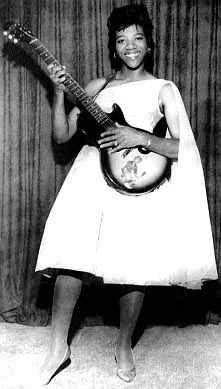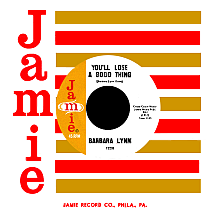BARBARA LYNN
You'll Lose a Good Thing
"You'll Lose a Good Thing," one of the best-known hit songs to come out of the U.S. Gulf Coast region between Houston and New Orleans, was produced by Huey P. Meaux, who proudly wore the nickname "The Crazy Cajun," both personally and professionally. He opened a barber shop in 1958 in Beaumont, Texas (about 125 miles west of his birthplace in Wright, Louisiana) and later got his kicks hosting a nightly radio show on KPAC, a station in nearby Port Arthur. He began promoting local musicians and producing some of their records; lucky for him Beaumont was home to a left-handed guitar playing schoolgirl who'd gotten into the habit of jotting down ideas for poems, many of which were turned into songs. Barbara Lynn Ozen first crossed Meaux's radar around 1960 when, at age 18, she'd already chalked up more than two years of experience performing in local over-21 clubs.
Her Creole parents (having French and Spanish ancestry) had moved to Beaumont from rural Louisiana in the late 1920s. She developed an early interest in music, taking piano lessons and singing at church and in her school choir. When she saw Sister Rosetta Tharpe showing off some electric guitar riffs on a TV variety series, Barbara switched instruments, trying out her southpaw approach on a ukulele before working her way up to the guitar. Texas bluesman Clarence "Gatemouth" Brown and New Orleans-based "Things That I Used to Do" hitmaker Guitar Slim (real name: Eddie Jones) were other guitarists whose dynamic styles she admired. Around '56 or '57 during high school, she formed a band with a couple of other girls; Bobbie Lynn and her Idols made quite an impression at school dances and parties and soon classmates were calling her "Lady Elvis." By the time New Orleans-based singer Joe Barry discovered her in a Beaumont-area club post-high school, she had developed a distinctive vocal style, comfortable stage presence and solid command of her strung-for-a-lefty Gibson electric guitar.
With urging from Barry, Meaux went to see this impressive Miss Ozen perform and wasted no time in getting her parents to agree to let her record some songs at Cosimo Matassa's infamous J&M studio in New Orleans; some of Matassa's regular musicians (including bassist Mac Rebennack, who later became famous under his alias, Dr. John) played on the early 1962 session. Four of her originals were mastered that night, including "Dina and Patrina" (a simple tune with a friendship theme) and "Give Me a Break," which Meaux chose for the A and B sides of her first single on his Eric label. In hindsight the more obvious choice would have been "You'll Lose a Good Thing," conceived years earlier as a poem about a former high school boyfriend. Everything went smoothly; Cosimo himself was impressed with Barbara's professionalism and recommended the song to Harold Lipsius of Jamie/Guyden, a Philadelphia-based company (guitarist Duane Eddy lent his "twang" to many hits for the label) known to release many independently-produced recordings.
Music fans got the message Barbara Lynn was puttin' down ('This is my last time, not asking anymore...if you don't do right, I'm gonna march out of that door...') and in August 1962 her first Jamie Records disc was number one on Billboard's rhythm and blues chart and had reached the pop top ten. It also went to number two on the KPAC radio survey; even with Meaux's juice as an on-air personality, it couldn't topple Bobby Vinton's "Roses Are Red (My Love)." Little did it matter, as Huey soon left the station and closed his barber shop to devote all his energy to the music business. Suddenly, Barbara was touring the country with top acts like James Brown, Jackie Wilson and Ike and Tina Turner; her mother accompanied the 20-year-old hitmaker, witnessing her daughter's talents for herself. Later, Barbara toured Europe and by the mid-'60s was gigging with one of her idols, Gatemouth Brown.
More original songs were released (writer credit sometime shown as B.L. Ozen), but gained less attention than the initial hit, though a dozen of her recordings achieved chart positions over a nine-year span. The catchy "Second Fiddle Girl" was produced with a full-on New Orleans sound, while the bluesy "You're Gonna Need Me" came off like a post-breakup sequel to her signature hit and peaked just shy of the R&B top ten. Her first single of 1963, a remake of the Otis Blackwell-Elvis Presley classic "Don't Be Cruel," defied expectations. An original, "To Love or Not to Love," followed by "I Cried at Laura's Wedding" penned by Dick "Hot Diggity" Manning and Kay "Wooden Heart" Twomey, deliberated further on the subject of love and heartbreak.

One of her career highlights came in the spring of '64 with "Oh! Baby (We Got a Good Thing Goin')," a vibrant offering that became her third top 20 R&B hit. Several months later, when a version by The Rolling Stones was included on the early-'65 album The Rolling Stones, Now! (Mick Jagger called Barbara to ask for permission), it was icing on the cake; to have her song recorded by a major recording act was something she couldn't have envisioned a year or two earlier. A couple of other songs ("Don't Spread it Around" and "It's Better to Have It") had minor chart runs, then her Jamie output ran out of steam and she was dropped from the label. Huey Meaux, meanwhile, had started his new Tribe label, scoring with "She's About a Mover" by San Antonio, Texas rocker Doug Sahm and his band The Sir Douglas Quintet. Barbara became a Tribe member in '66 and her first two 45s are fan favorites: an original, "I'm a Good Woman," and a soul classic, "You Left the Water Running," written by Rick Hall, Dan Penn and Oscar Frank (originally recorded by Billy Young for Chess, it was Barbara's that reached the national charts).
She joined Atlantic Records in 1967 and, with Meaux still producing, had one of her better-selling singles, "This is the Thanks I Get." Taking a break from the business near the end of the decade, she got married in 1970, at age 28, and began raising a family, though before long, the diversion that defined her life took over again. Another original composition, "(Until Then) I'll Suffer," appeared on Meaux's Jet Stream label and had a sound fully in sync with the soul music of the early '70s. Atlantic issued the single and it got her back on the charts in the spring of 1971. After leaving Atlantic for good in 1973, she made more recordings for Jet Stream and other regional labels. Huey Meaux remained active, producing several hits for San Benito, Texas native Freddy Fender including a remake of "You'll Lose a Good Thing," a top 40 pop single and one of four number one country hits Fender had in 1975 and '76.
After Barbara's husband passed away in the early 1980s, she started gigging again and made a few recordings for the Jam Stone and Ichiban labels. Some years later, promoter and "Ponderosa Stomp" festival founder Ira Padnos approached her with ambitious ideas about performing on the worldwide stage; she embarked on several extensive tours of Asia, in particular Japan, where she was very well received. Throughout the years, Barbara Lynn has continued performing, sharing her stories with audiences while making significant use of her collection of finely-tuned left-handed electric guitars.


